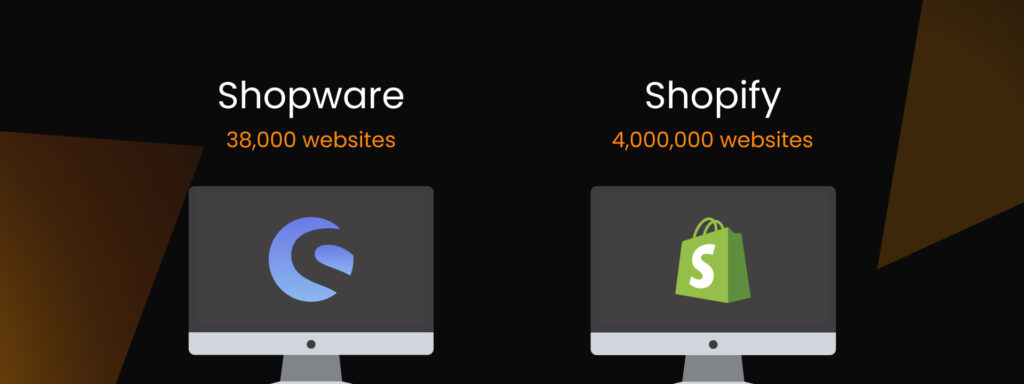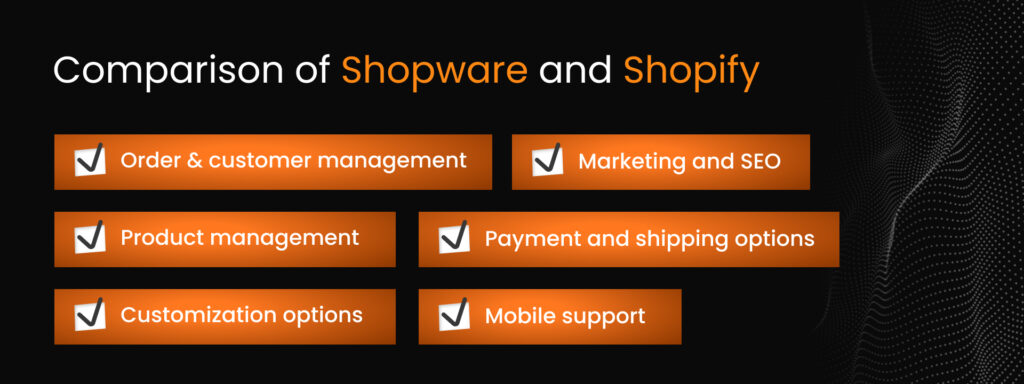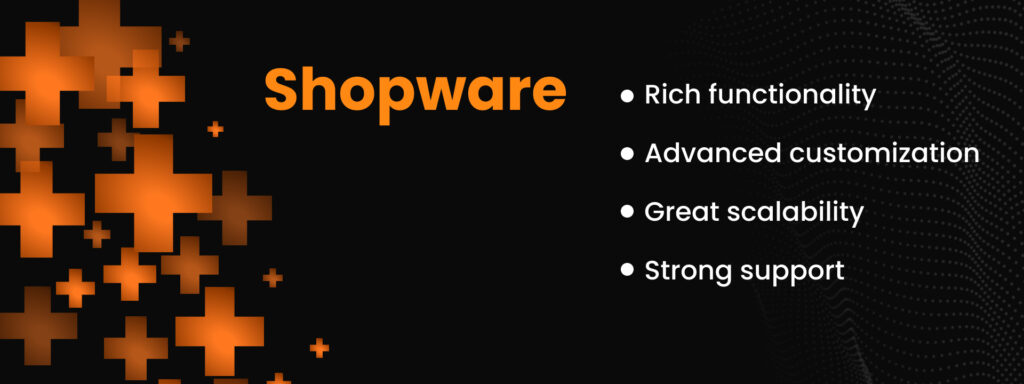When it comes to building an eCommerce store, it can be overwhelming to decide which platform is the best fit for your business. Two popular options that connect customers and sellers all over the world are Shopware and Shopify.
For example, Shopware is used by over 6 ,000 businesses and the numbers are still growing. There are almost 38 ,000 live websites based on it. It also has received numerous awards from G2 — the leading B2B peer review platform.

Shopify is used by over 4 ,000,000 live websites and more than 2 ,800,000 are used in the US. But which one is the better choice for your store in 2023?
In this article, we will compare the two platforms and dive into the pros and cons of each to help you make an informed decision. From ease of use to the available features and pricing, we will cover everything you need to know to choose the right platform for your store.
So, whether you’re just starting out your eCommerce business or looking to upgrade your existing marketplace, this article will provide you with all the information you need to make the right choice for your business.
Which eCommerce Platform Reigns Supreme?
In this article, we’ll be comparing two popular eCommerce platforms: Shopify vs Shopware. Both eCommerce platforms are the best in the market and offer a wide range of features. But when it comes down to it, which platform is the best choice for your business?
To answer this question, we’ll be taking a close look at both Shopify vs Shopware and comparing them on a range of factors, including their features and functionality, ease of use, pricing and cost, integration and extension options, and customer support and resources.

At the end of this analysis, we’ll give our verdict on which platform we believe is better in the eCommerce world. But ultimately, the right choice for your business is yours, so be sure to carefully consider all the factors before making your decision.
Feature-by-Feature Comparison of Shopware and Shopify
This article compares the features of two eCommerce platforms, Shopware and Shopify. We will look at each platform’s features in detail to give you a better understanding of its capabilities and limitations. This will help you make a decision on which platform is right for your business.
Product management
Both Shopware and Shopify offer tools for managing your product catalog including the ability to add, edit, and delete products as well as set up product variants, and assign categories and tags.

Order and customer management
When using both Shopware and Shopify, you have the ability to:
- track orders status
- process refunds
- view customer profiles.
Payment and shipping
The platforms feature the following:
- range of payment methods like PayPal and credit card payments (learn more payment gateways)
- real-time shipping rates
- shipping label prints.
Marketing and SEO
Both Shopware and Shopify offer a range of marketing and SEO tools to help you promote your products and improve your search engine visibility. This includes features like email marketing, social media integration, and built-in SEO optimization tools (read more about SEO for eCommerce in our blog).
Mobile support
Both platforms offer mobile-optimized versions of their online stores, allowing customers to shop on the go.
Do you need a mobile optimized e-store for your business?
Give us your contact details and we’ll meet your demands in no time!
Customization
Both Shopware and Shopify offer a range of customization options for themes and templates.
As we compare these and other features of Shopware and Shopify, we’ll be considering not only the presence or absence of certain features but also the ease of use and overall quality of each platform’s implementation.
By the end of this feature-by-feature comparison, you should have a clear understanding of the capabilities and limitations of each platform, and be well-equipped to make an informed decision about which one is right for your business.
Pros and Cons of Shopware
Both platforms have their strengths and weaknesses. Here, we’ll be giving a comparison, as we believe it offers a more comprehensive and scalable solution for online merchants.
Here are some of the key pros and cons of each platform.
Shopware Pros

- Wide range of features and functionality: Shopware offers a comprehensive set of tools for managing your online store, including support for multiple languages and currencies, advanced product and order management, and a range of marketing and SEO tools.
- Customization options: Shopware offers a range of customization options, including the ability to use custom themes and templates, and make use of CSS and HTML to customize the look and feel of your online store.
- Scalability: Shopware is designed to scale with your business, making it a good choice for merchants who are looking to grow and expand their online operations.
- Strong community and support: Shopware has a large and active community of users and developers, as well as a range of resources and support options to help you get the most out of the platform.
Shopware Cons

- Steep learning curve: While Shopware offers a wide range of features and functionality, it can be a bit overwhelming for users who are new to eCommerce or not particularly tech-savvy.
- Limited payment gateway options: Shopware currently only supports a limited number of payment gateways, which may be limiting for merchants who need to support a specific payment method.
Pros and Cons of Shopify
Let’s dive deeper into the details of Shopify pros and cons:
Shopify Pros

- Ease of use: Shopify is known for its user-friendly interface and intuitive navigation, making it a good choice for beginners or those who are new to eCommerce.
- Wide range of payment gateway options: Shopify supports a wide range of payment gateways, including support for popular payment methods like PayPal and credit card payments.
- Strong customer support: Shopify offers excellent customer support, including a range of resources and a dedicated support team to help you get the most out of the platform.
Shopify Cons

- Limited customization options: While Shopify offers a range of customization options, they are somewhat limited compared to other platforms like Shopware.
- Higher transaction fees: Shopify charges higher transaction fees than some other platforms, which can be a drawback for merchants with high volume sales.
- Limited scalability: While Shopify is a good choice for small and medium-sized businesses, it may not be the best option for larger enterprises that need more advanced features and functionality.
Overall, both Shopware and Shopify have their pros and cons, and the right choice for your business will depend on your specific needs and goals. However, we believe that Shopware offers a more comprehensive and scalable solution for online merchants, and is the better choice for businesses looking to grow and expand their operations.
Pricing Breakdown: Shopware 6 vs Shopify
Now we will be comparing prices and different feature rates, but to see all the features in greater detail check Shopware and Shopify official websites.
Shopware Pricing Plans
Rise – from 600 Euro / USD per month
Feature rate:

- Content management & design – 4/5
- Workflow & automation – 3/5
- Customer experience & Marketing – 2/5
- Inventory & order management – 2/5
- B2B capabilities – 1/5
- Support level – 1/3
Evolve – Custom price

Feature rate:
- Content management & Design – 5/5
- Workflow & Automation – 4/5
- Customer experience & Marketing – 4/5
- Inventory & Order management – 2/5
- B2B capabilities – 4/5
- Support level – 2/3
Beyond – Custom price

Feature rate:
- Content management & Design – 5/5
- Workflow & Automation – 5/5
- Customer experience & Marketing – 5/5
- Inventory & Order management – 5/5
- B2B capabilities – 5/5
- Support level – 3/3
Shopify Pricing Plans
Basic – 24 Euros per month

Features:
- Basic reports
- 2 staff accounts
- Up to 4 inventory locations
Standard – 69 Euros per month

Features:
- Professional reports
- 5 staff accounts
- Up to 5 inventory locations
Advanced – 289 Euros per month

Features:
- Custom report builder
- 15 staff accounts
- Up to 8 inventory locations
Please note that the pricing for Shopware and Shopify may change over time, and the exact pricing for each plan may vary depending on your specific needs and requirements. It’s also worth noting that both platforms offer a range of additional features and functionality that may come with additional costs.
Customer Reviews and Ratings: Shopify vs Shopware
Let’s take a look at customers’ reviews and ratings.
- According to Capterra, Shopware has an overall rating of 4.6/5:
- “Scalable, easy to use, API first E-commerce platform “
- Pros: A CMS that helps the merchant really create shopping experiences that would be hard to create with other eCommerce platforms.
- Cons: Lacking functionalities are built every day. So the current cons will be gone soon.
- Reasons for Choosing Shopware: Total cost of ownership ease of use for merchant
- Likelihood to recommend to others 10/10

- According to Capterra, Shopify has an overall rating of 4.5/5
- “Easy for first-time e-commerce business”
- Overall: Mostly positive. It is intuitive and we’ve had a positive experience with customer support.
- Pros: Ease of setting up and basic management. If you’re new to e-commerce but still want a decent website, Shopify is simple enough to set up on your own.
- Cons: Some features require additional payment or an upgraded plan. This can be limiting if you’re just starting out but still want a website optimized for growth.
- Likelihood to recommend to others 7/10

But if you are still not sure which to choose and want to see another alternative, then Magento might be the one for you!
These ratings suggest that both Shopware and Shopify are highly rated by their users, with Shopware slightly outperforming Shopify in terms of overall customer satisfaction. However, it’s worth noting that the specific features and functionality that are most important to your business may vary, and it’s always a good idea to read through multiple reviews and ratings to get a more well-rounded understanding of each platform.
What Business Giants Use Shopware?
Here we are going to look at some well-known businesses and brands that use Shopware-built websites for their stores:

- New Balance: one of the world’s major sports footwear and apparel manufacturers.
- Aston Martin: luxury British sports car manufacturer.
- Bosch: one of the leading global suppliers of technology and services.
- Dakine: American outdoor clothing company specializing in sportswear and sports equipment for adventure sports.
- Euronics: leading international electrical retail group.
- Douglas: Europe’s leading premium beauty platform.
Expert Opinion: Our Verdict on Shopify vs Shopware
After conducting a thorough analysis of Shopware 6 vs Shopify, we believe that Shopware is the better choice for online merchants. Here are some of the key reasons why we believe Shopware stands out as the superior platform:

- Wide range of features and functionality: Shopware offers a comprehensive set of tools for managing your online store, including support for multiple languages and currencies, advanced product and order management, and a range of marketing and SEO tools. These features make it a good choice for merchants who need a more advanced and scalable solution.
- Customization options: Shopware offers a range of customization options, including the ability to use custom themes and templates. You can make use of CSS and HTML to customize the look and feel of your online store. This makes it a good choice for merchants who want more control over the look and feel of their online store.
- Scalability: Shopware is designed to scale your business, making it a good choice for merchants who are looking to grow and expand their online operations.
- Strong community and support: Shopware has a large and active community of users and developers, as well as a range of resources and support options to help you get the most out of the platform.
If you feel that Shopware is a perfect fit for you, get our top-notch Shopware development services right now.
That being said, Shopify is also a strong platform with many satisfied users. Its user-friendly interface and wide range of payment gateway options make it a good choice for beginners or those who are new to eCommerce. Ultimately, the right choice for your business will depend on your specific needs and goals, so be sure to carefully consider all the factors before making your decision.
